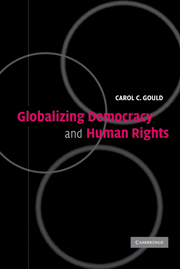Book contents
- Frontmatter
- Contents
- Acknowledgments
- Introduction: Between the Personal and the Global
- PART I THEORETICAL CONSIDERATIONS
- PART II DEMOCRACY AND RIGHTS, PERSONALIZED AND PLURALIZED
- 3 Embodied Politics
- 4 Racism and Democracy
- 5 Cultural Identity, Group Rights, and Social Ontology
- 6 Conceptualizing Women's Human Rights
- PART III GLOBALIZING DEMOCRACY IN A HUMAN RIGHTS FRAMEWORK
- PART IV CURRENT APPLICATIONS
- Index
6 - Conceptualizing Women's Human Rights
Published online by Cambridge University Press: 23 November 2009
- Frontmatter
- Contents
- Acknowledgments
- Introduction: Between the Personal and the Global
- PART I THEORETICAL CONSIDERATIONS
- PART II DEMOCRACY AND RIGHTS, PERSONALIZED AND PLURALIZED
- 3 Embodied Politics
- 4 Racism and Democracy
- 5 Cultural Identity, Group Rights, and Social Ontology
- 6 Conceptualizing Women's Human Rights
- PART III GLOBALIZING DEMOCRACY IN A HUMAN RIGHTS FRAMEWORK
- PART IV CURRENT APPLICATIONS
- Index
Summary
In this part of the book, I have taken up the project of globalizing democracy and human rights in the important, although limited, sense of conceiving them to apply both more personally and in more plural ways than is customary. The idea of a more embodied politics, the critical analysis of race and racism and their import for democracy, and the analysis of cultural identities and group rights are all aspects of the broad reconceptualization that I believe is required. In this chapter, I turn finally to the issue of interpreting human rights to make them more relevant to women's experience.
There has already been considerable progress in reformulating human rights along these lines. At both the theoretical level and in more concrete efforts through the Convention on the Elimination of All Forms of Discrimination against Women (CEDAW) and the work of women's nongovernmental organizations (NGOs), as well as in certain legislative and judicial interpretations in various countries, human rights have increasingly been extended to rectifying discrimination against women and promoting women's health and education needs, and have begun to be put to use to address gender-specific violence against women. Of course, in practice, this effort has only scratched the surface of the very deep structural inequalities and endemic violence often faced by women because of the profound social effects of historically sedimented systems of patriarchal oppression.
- Type
- Chapter
- Information
- Globalizing Democracy and Human Rights , pp. 139 - 156Publisher: Cambridge University PressPrint publication year: 2004



